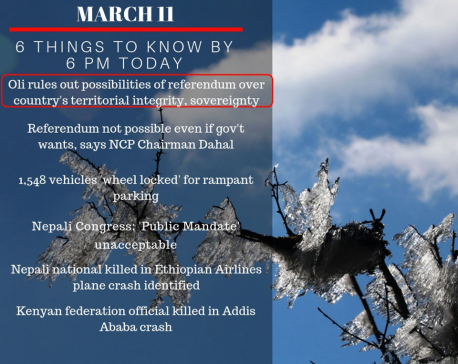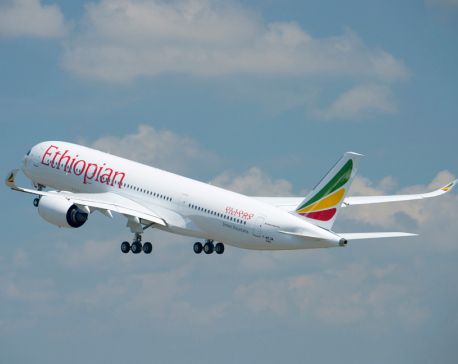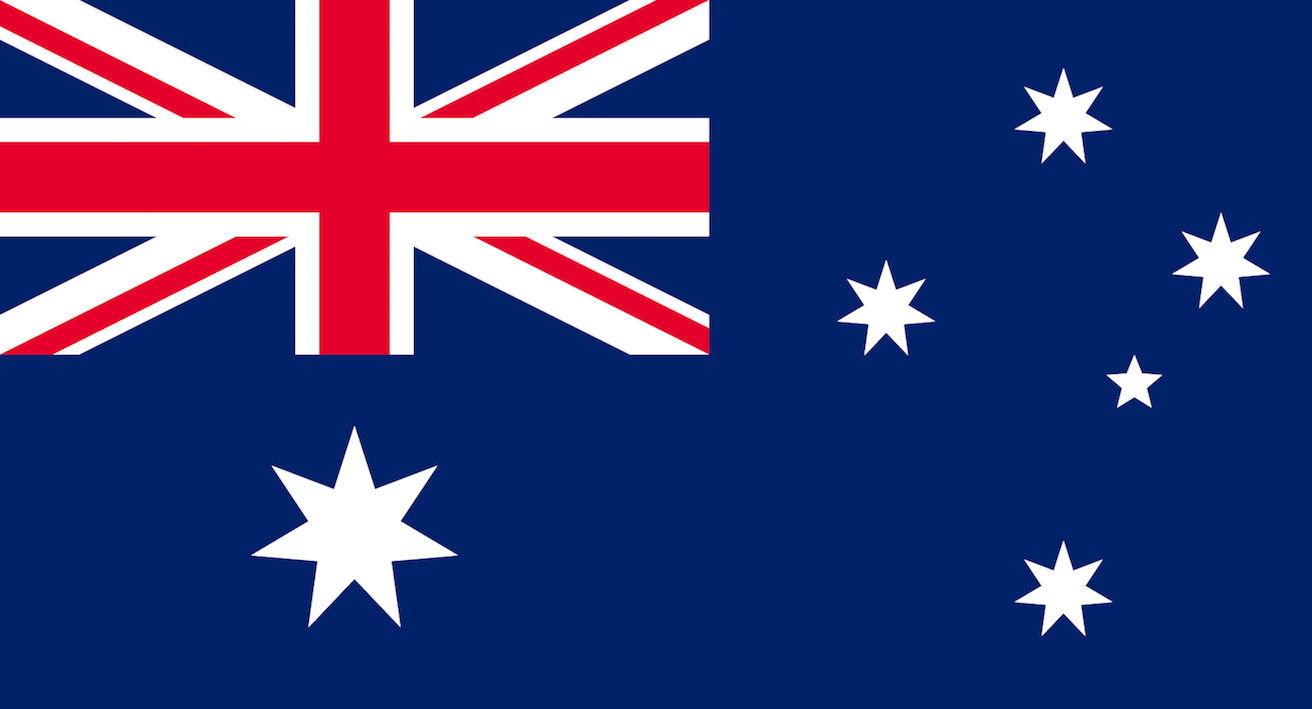
OR
Ethiopia says crash black boxes show similarities to Lion Air accident
Published On: March 18, 2019 10:30 AM NPT By: Reuters

ADDIS ABABA/WASHINGTON, March 18: Ethiopia said on Sunday the crash of an Ethiopian Airlines plane that killed 157 people had “clear similarities” with October’s Lion Air crash, revealed by initial analysis of the black boxes recovered from the wreckage of the March 10 disaster.
The crash has generated one of the most widely watched and high-stakes inquiries for years, with the latest version of Boeing’s profitable 737 workhorse depending on the outcome.
Both planes were MAX 8s, and both crashed minutes post take-off after pilots reported flight control problems. Concern over the plane’s safety has caused aviation authorities to ground the model, wiping billions of dollars off Boeing’s market value.
“It was the same case with the Indonesian (Lion Air) one. There were clear similarities between the two crashes so far,” Ethiopian transport ministry spokesman Muse Yiheyis said.
“The data was successfully recovered. Both the American team and our (Ethiopian) team validated it,” he told Reuters, adding that the ministry would provide more information after three or four days.
In Washington, however, U.S. officials told Reuters the FAA and U.S. National Transportation Safety Board (NTSB) had not yet validated the data.
Boeing’s safety analysis of a new flight control system known as MCAS on MAX jets had several crucial flaws, one of which was that it understated the power of the system, the Seattle Times said on Sunday.
The FAA also did not delve in detailed inquiries and followed a standard certification process on the MAX, the paper said, citing an FAA spokesman.
The FAA declined to comment on the report but referred to previous statements about the certification process. It has said the process followed FAA’s standard process.
Citing people familiar with the inquiry, the Wall Street Journal said the U.S. Department of Transportation was investigating the FAA’s approval of MAX jets.
The inquiry by the department's inspector general was launched after the Lion Air crash that killed 189 people, the newspaper said on.wsj.com/2Hrzvlq, and focuses on whether the FAA used appropriate design standards and engineering analyses in certifying MCAS.
Boeing and the FAA declined to comment on the WSJ report.
Two government officials briefed on the matter told Reuters it would not be surprising for the Transportation Department to investigate a major safety issue, but could not immediately confirm the report.
SAFETY ANALYSIS
An official told Reuters that when investigators - after reviewing black box data from the Ethiopian Airlines crash - return to Addis Ababa to conduct interpretive work, the NTSB and FAA will assist in verification and validation of the data.
A second source said little information had been circulated between parties about the contents of data and voice recordings.
It was not clear how many of the roughly 1,800 parameters of flight data and two hours of cockpit recordings, spanning the doomed six-minute flight and earlier trips, had been taken into account in the preliminary Ethiopian analysis.
International rules require a preliminary report on the crash to be released within 30 days.
Previous air crash reports show that in such high-profile cases there can be disagreements among parties about the cause.
In Paris, France’s BEA air accident investigation agency said data from the jet’s cockpit voice recorder had been successfully downloaded. The French agency said on Twitter it had not listened to the audio files and the data had been transferred to Ethiopian investigators.
In Addis Ababa, a source who has listened to the air traffic control recording of the plane’s communications said flight 302 had an unusually high speed after take-off before it reported problems and asked permission to climb quickly.
Last Monday, Boeing said it would deploy a software upgrade to the 737 MAX 8, hours after the FAA said it would mandate “design changes” in the aircraft by April.
Boeing was finalising the software change and a training revision and would evaluate new information as it became available, Chief Executive Dennis Muilenburg said in a statement on Sunday, after the Ethiopian transport ministry’s comments.
A Boeing spokesman said the 737 MAX was certified in line with identical FAA requirements and processes that governed certification of all previous new airplanes and derivatives. The spokesman said the FAA concluded that MCAS on 737 MAX met all certification and regulatory requirements.
You May Like This

Amazon confirms two employees in Italy have contracted coronavirus
WASHINGTON, March 2: Amazon.com Inc said late on Sunday that two employees in Milan, Italy, have contracted the coronavirus and... Read More...

March 11: 6 things to know by 6 PM today
Your daily dose of missed important news of the day. ... Read More...

Chinese carriers, Ethiopian Airlines suspend use of Boeing 737 MAX 8 aircraft after crash
BEIJING/SHANGHAI, March 11: China’s aviation regulator on Monday grounded nearly 100 Boeing Co 737 MAX 8 aircraft operated by its... Read More...




Just In
- RBB invites applications for CEO, applications to be submitted within 21 days
- Telephone service restored in Bhotkhola after a week
- Chemical fertilizers imported from China being transported to Kathmandu
- Man dies in motorcycle accident in Dhanusha
- Nepal face early setback as four wickets fall in powerplay against UAE
- Australian unemployment rate rises to 3.8 percent in March
- Gold price increases by Rs 700 per tola
- Fire destroys wheat crop in Kanchanpur, Kailali














Leave A Comment